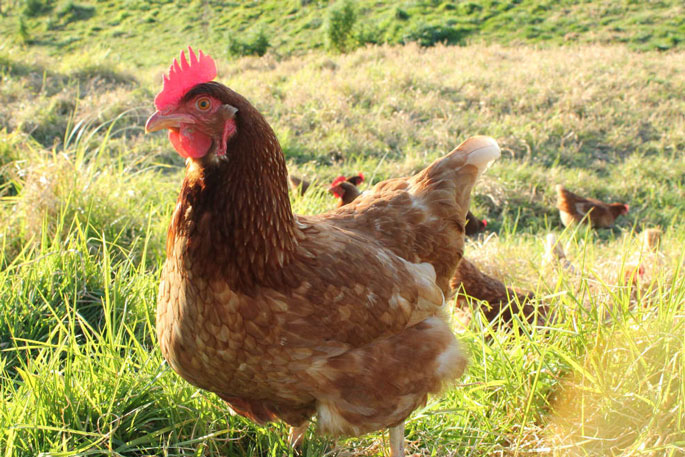Biosecurity New Zealand has placed strict movement controls on a commercial rural Otago egg farm, as the first case of high pathogenic avian influenza, otherwise known as bird flu, is confirmed in Aotearoa.
Deputy director-general Stuart Anderson said testing confirmed a high pathogenic strain of avian influenza in chickens that has likely developed from interactions with local waterfowl and wild birds.
"Tests from the Mainland Poultry managed farm have identified a high pathogenic H7N6 subtype of avian influenza. While it is not the H5N1 type circulating among wildlife around the world that has caused concern we are taking the find seriously," Anderson said.
"Our testing shows it is unrelated to a H7 strain that was identified in Australia earlier this year and we believe this case may have happened as part of a spillover event, where laying hens who were foraging outside of the shed were exposed to a low pathogenic virus from wild waterfowl.
"Low pathogenic viruses are present in wild birds here, especially waterfowl like ducks, geese, and swans and the virus can mutate on interaction with chickens.
"It is important to note that the strain found on this farm is not a wildlife adapted strain like H5N1, so we believe it is unlikely to be transmitted to mammals," Anderson said.
There had been no reports of other ill or dead birds on other poultry farms and there are no human health or food safety concerns.
It is safe to consume thoroughly cooked egg and poultry products.
Anderson said quick action had been taken in co-operation with Mainland Poultry and a restricted place notice issued.
"Test results late last night [Sunday] confirmed the strain, but we already had restrictions in place and expert biosecurity staff on site, with more arriving today [Monday]. Mainland Poultry took the right steps by reporting ill birds in one shed on the property and locking that building down as testing continued.
"We will move quickly, with Mainland Poultry, to depopulate birds on the remote property and we've placed a 10-kilometre buffer zone around it alongside the restrictions preventing movement of animals, equipment, and feed.
"We aim to stamp this out like we did with infectious bursal viral disease that affected chickens in 2019," Anderson said.
John McKay, chief executive of Mainland Poultry, which manages the free-range farm said it was committed to taking quick action.
"We have been preparing for an event like this for some time knowing that low pathogenic avian influenza is already present in New Zealand wild birds. Fortunately, this is not the H5N1 type that has caused concern for wildlife in other parts of the world.
"International experience with avian influenza has shown us this particular strain (H7N6) can be eradicated quickly and successfully.
"We will be working closely with MPI to depopulate the affected shed, ensure rigorous testing of all other birds on the farm and manage the situation effectively. I'm confident with swift action and collaboration we can eradicate this," McKay said.
Anderson said Biosecurity New Zealand was working closely with industry partners to ensure the find was dealt with quickly and any possible impacts to trade limited.
"Importantly, the farm has strong biosecurity standards and Mainland is helping with ongoing investigation and tracing of animal movements.
"We have put a lot of effort in with the poultry and egg sector, the Department of Conservation, and Ministry of Health to prepare for H5N1 and that puts us in a good position to deal with the less virulent H7N6 strain found on this farm.
"If anyone sees three or more sick or dead wild birds in a group, report it immediately to the exotic pest and disease hotline on 0800 80 99 66 so we can investigate the cause." Anderson said.



1 comment
The Master
Posted on 02-12-2024 14:32 | By Ian Stevenson
So the suggestion here is that chickens forging outside (not in the hen house, where safe etc) have picked up some virus that naturally exists in nature? Maybe this "natural" thing has a few downsides to it... like wiping out large parts of the chicken industry...
Maybe the Chickens need to stay inside?
Leave a Comment
You must be logged in to make a comment.